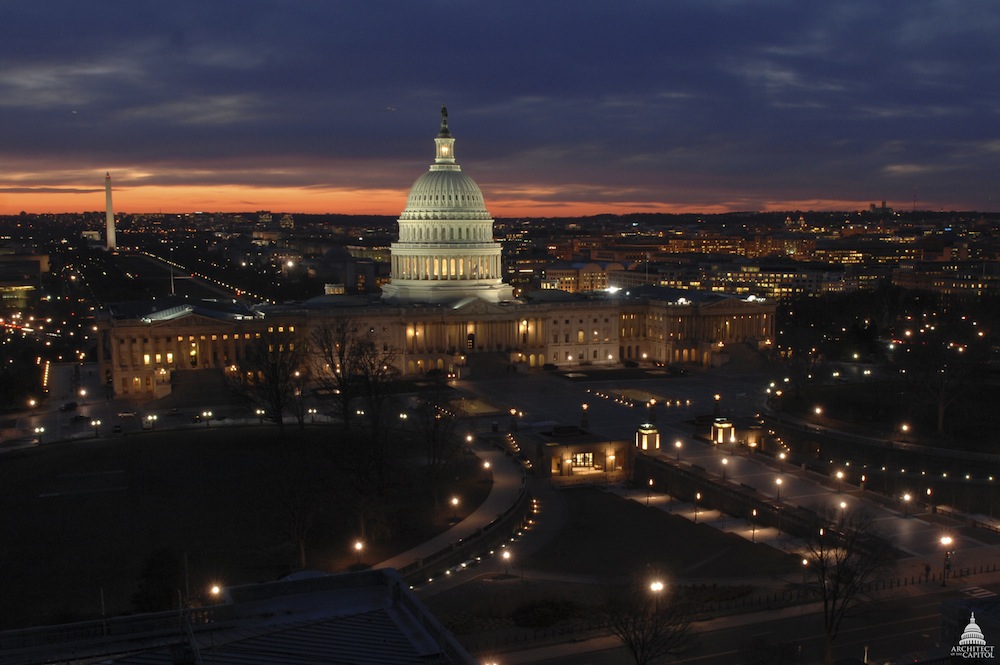Does Big Government Make People Happy?

In a time of vicious budget debates on Capitol Hill, a new study finds that the path to happiness might be through big government.
But the findings aren't likely to be the last word on the topic, underscoring the difficulty of answering the prevailing political question in the U.S. right now: How large should government be?
According to the new research, published in April in the journal Politics and Policy, bigger governments make for more satisfied citizens. The results, which rank the U.S. 10th out of 15 industrialized democracies in life satisfaction of citizens, seems to suggest that bumping up social welfare expenditures would make for a happier populace. But "suggest" is the key word, according to University of Pennsylvania economist Justin Wolfers, who was not involved in the research.
"The study as a whole is suggestive, but not convincing," Wolfers told LiveScience. "And the reason I say that is it's ultimately a study of [only] 15 countries." [See the rankings of all 15 countries]
Nonetheless, said Richard Easterlin, an economist at the University of Southern California who studies life satisfaction, the findings are "pretty plausible." Citizens in countries that transition from socialism to capitalism often don't experience the happiness boost one might expect from the resulting influx of goods and services, Easterlin told LiveScience. The reason may be that they lose out on perks like guaranteed health care.
"There really are areas where it seems like the market doesn't do the job," Easterlin said.
Happy citizens
Get the world’s most fascinating discoveries delivered straight to your inbox.
To tackle the question of whether government makes people happy by providing social services, or unhappy by squelching efficiency and growth, Baylor University political scientist Patrick Flavin and his colleagues used data from the 2005 to 2008 World Values Survey. This survey asks residents of countries around the world how satisfied they are with their lives, among other questions. The researchers limited their analysis to industrialized democracies so they'd be comparing a similar slate of nations. Among the countries studied were Australia, France, South Korea, Spain, Switzerland and the United States. [Read Who's Happier: Europeans or Americans?]
For each country, the researchers measured the size of the government in four ways: the country's tax revenue as a percent of its gross domestic product (GDP), the government's consumption as a percent of real per capita GDP, average unemployment benefits and social welfare expenditures as a percent of GDP.
After controlling for factors that could skew the results, including health and age of respondents, church attendance, unemployment rates, and the level of individualism in the country's culture, the researchers found that the happiest countries were those with big, busy governments. The result remained even when the researchers took into account the fact that government size and benefits can influence variables such as unemployment and marriage rates, Flavin told LiveScience.
"The jump in happiness in going from a country that's low on the government intervention scale to one that is high on the government intervention scale is about the same as the effect of getting married," Flavin said.
Out of the 15 countries studied, the United States ranked 14th for both tax revenue as a percent of GDP and in social welfare expenditures as a percent of GDP; 13th for government's share of consumption; 11th for unemployment benefits; and 10th for life satisfaction.
The effect is largest for the poor, Flavin said, but richer citizens in big-government countries reported more satisfaction than their small-government counterparts, too.
"This is one piece of evidence that we should think long and hard about, what the effect on citizens' well-being would be if we starting changing Medicare to a voucher system or reducing welfare benefits," Flavin said.
Room for interpretation
The study isn't the first to link government intervention with happiness. One of Flavin's co-researchers authored a 2010 paper in the Journal of Politics finding that U.S. states with bigger governments have happier citizens. [Read: Happiest States Revealed by New Research]
On the other hand, a 2007 study published in the journal Public Choice used the same World Values Survey from 1997 to 2001 to compare government size (as measured by the percent of GDP made up by government consumption) and life satisfaction in 74 countries. That study found the opposite result as Flavin's: Bigger governments seemed to make people unhappy.
Justina Fischer, a senior researcher in economics at the University of Mannheim in Germany and a researcher on the 2007 study, said she thought the difference could stem from the different time periods in which the data was gathered. In the late 1990s, she said, the countries studied had left-leaning governments that may have grown the government too large; In 2005 to 2008, when Flavin's data were taken, those governments had shifted rightward.
"Given this change in governments between the 1990s and 10 years later, I think their finding is an effect of conservative governments cutting too much," Fischer told LiveScience.
In other words, Fischer said, there could be a certain balance between government size and private efficiency that both studies are dancing around. Fischer's study, she said, caught people's attitudes during a time of too much government, so cuts to government spending drew them back toward the ideal. Later, governments may have overcorrected, meaning that a tendency not to cut as much made people happier.
Measuring happiness and government size is difficult, Wolfers told LiveScience, not only because it can be tough to define what those variables mean, but also because cultural differences can confound the results. Nordic countries, which ranked high in happiness in Flavin's study, tend to be cheerful places, Wolfers said, while former communist countries are never quite as happy as would be expected.
To get to the bottom of the question, Wolfers told LiveScience, economists would have to conduct larger studies on more countries. The ideal study would randomly assign people to live in states with big governments and states with small governments and then watched to see how happy they become. Obviously, that sort of research isn't possible, Wolfers said, so conclusions about government size and happiness have to be drawn "from a pastiche of evidence." That leaves room for interpretation.
"It's very likely that a Democrat and a Republican would read that evidence and come to different conclusions," Wolfers said. "And that's because we don't have that single perfect experiment."
You can follow LiveScience senior writer Stephanie Pappas on Twitter @sipappas. Follow LiveScience for the latest in science news and discoveries on Twitter @livescience and on Facebook.

Stephanie Pappas is a contributing writer for Live Science, covering topics ranging from geoscience to archaeology to the human brain and behavior. She was previously a senior writer for Live Science but is now a freelancer based in Denver, Colorado, and regularly contributes to Scientific American and The Monitor, the monthly magazine of the American Psychological Association. Stephanie received a bachelor's degree in psychology from the University of South Carolina and a graduate certificate in science communication from the University of California, Santa Cruz.
 Live Science Plus
Live Science Plus





